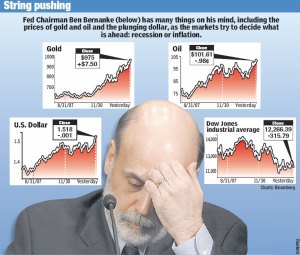You are currently browsing the tag archive for the ‘economic policy’ tag.
Our entire economy is in danger.
Those were the words of President Bush in an address last night. I couldn’t help but feel oddly reminiscent…he went on to say:
We’re in the midst of a serious financial crisis, and the federal government is responding with decisive actions…I’m a strong believer in free enterprise, so my natural instinct is to oppose government intervention…these are not normal circumstances. The market is not functioning properly. There has been a widespread loss of confidence…Without immediate action by Congress, America can slip into a major panic.
I know I’ve heard this rhetoric before. Change a few of the 5 W’s–who, what, where, when, why–and this is another call to war. Not saying that he doesn’t have every right to be concerned about the state of our economy, since I and many other Americans are too. But we have also been urged in this manner before…rushed, appealed to, given the “something bad is gonna happen” speech. Right now everyone needs to be considering whether the newest economic bailout is the wisest option, the only option. If economists have their doubts–usually, well-versed in their field–then why shouldn’t the rest of America?
No, we don’t need another “fuzzy” war. We haven’t yet achieved victory the first one. Or the second one. Ha…I can hear it now…”We’ll wage this ‘War on Economy’,” which will quickly receive one of those catchy acronyms–W.O.E.
Let’s just hope that we’re not woefully misguided.
As far as days in the stock market go, today was nearly as bad as it gets. The Associated Press said:
In a vote that shook the government, Wall Street and markets around the world, the House on Monday defeated a $700 billion emergency rescue for the nation’s financial system, leaving both parties and the Bush administration struggling to pick up the pieces. The Dow Jones industrials plunged nearly 800 points, the most ever for a single day.
This news blurb certainly caught my attention. After analysis, it looks like $1.2 trillion in market value is gone because of the plan’s rejection. Those most concerned are left scratching their heads, mainly becuase another solution is without precedent (even though, I suppose the $700 billion bailout was too).
Apparently investors are not simply walking away from unknowns–they are moving at break-neck speeds. Although it probably was best for the U.S. to move away from this gigantic risk, you have to wonder what else is coming in this wildly growing financial crisis.
My mind comes back to some new information I’ve been given access to…economist Chris Martensen’s “Three Beliefs“. Watch all of the little mini-lessons, and you’ll start to see that most of world’s economic woes come from need, not so much greed. There are too many of us, and we all need the same resources. It makes me wonder what event or events will ease the pressure. World-wide tragedy? Perhaps, breakthough technology or a spiritual enlightenment? Bernanke has a lot to think about, but so do the rest of us.



